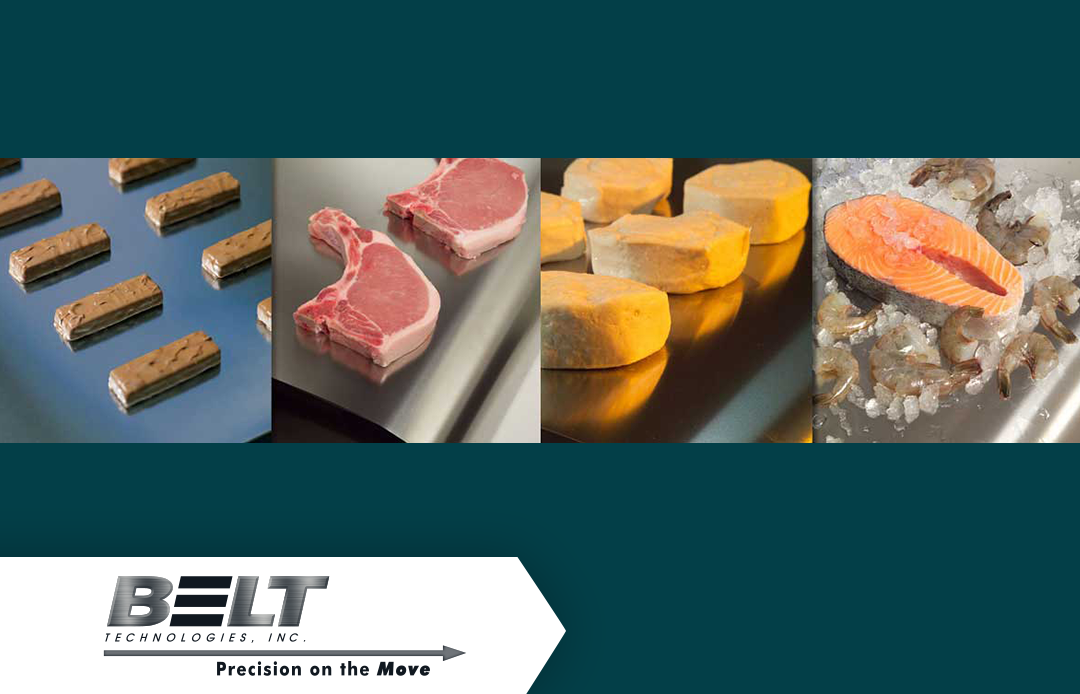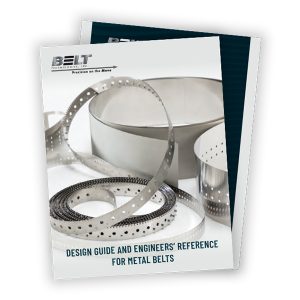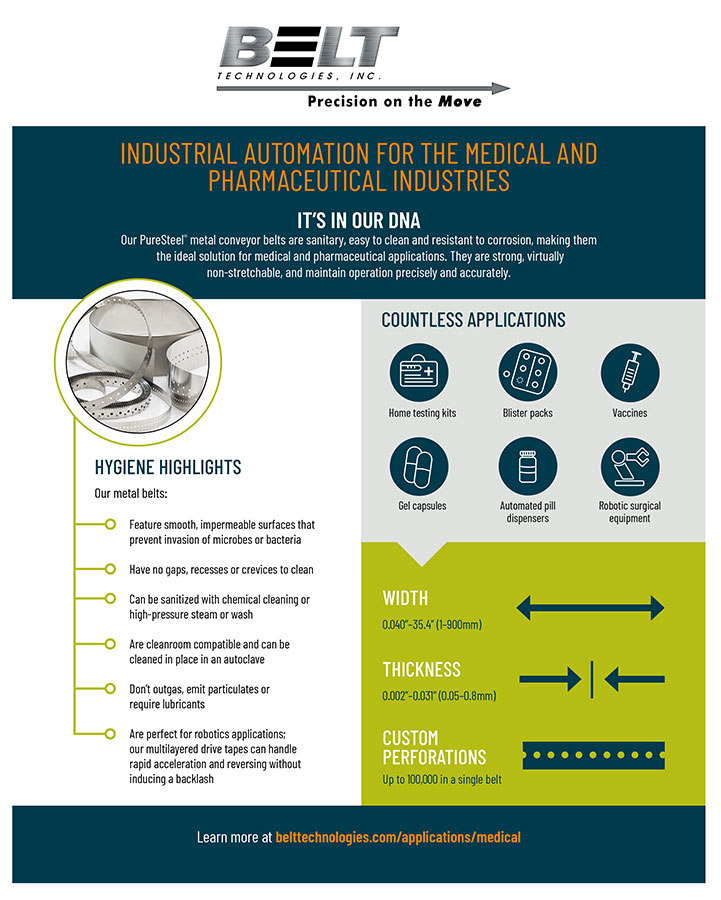Professionals in the food processing and packaging industry are all too familiar with the unique challenges that can accompany attempts to optimize their production line. While necessary for continued business growth, the pursuit of faster speed and greater efficiency cannot come at the expense of food safety concerns, nor at too great a cost in replacing rapidly worn or damaged parts.
Outbreaks of food-borne illnesses have become far too common, and there is greater focus than ever on finding solutions that can safeguard the public from health risks while allowing food processing businesses to improve capabilities and efficiencies. This has resulted in a demand for technologies and materials that offer advanced food safety benefits.
Our PureSteel® stainless steel belts, drive tapes and pulleys are more resistant to bacteria than plastic or other soft materials, and can withstand extreme temperatures, sudden temperature fluctuations and long-term heavy use, while simplifying and shortening the sanitizing process to help your operation maintain its stringent hygiene standards.
Bacteria Hate Our Belts
Multiple studies have shown that bacteria, including Salmonella and Listeria, attach in far higher numbers to hydrophobic materials like rubber and plastic than to stainless steel. There is also data showing that L. monocytogenes has a greater affinity to plastic materials than to stainless steel.
In a 2007 study published in the Journal of Food Protection, researchers concluded:
“Stainless steel shows weaker adhesion for bacteria and can be considered as the better type of conveyor belt to minimize cross-contamination. Similarly, cleaning is more efficient on hard surfaces such as stainless steel than on soft materials such as plastic.”1
Stainless steel contains an elevated level of chromium, which creates a surface oxide layer that helps prevent further oxidation. If a stainless steel belt’s surface is damaged or scratched, exposed metal oxidizes almost immediately in what could be described as a self-healing process.
Easy to Clean for Advanced Food Safety
A stainless steel belt can be heated to over 121°C (250°F) for sterilization—well above the temperatures bacteria can survive—as opposed to most plastic belts, which cannot withstand more than 100°C (212°F).
Additionally, the surface hardness of stainless steel is greater than that of polymer materials, discouraging the attachment of bacteria and providing a continuous, nonporous surface that lacks moving parts, joints or crevices that can harbor bacteria and is significantly easier to clean, even with lower-cost detergents and processes.
Endless stainless steel belts can be cleaned in place, significantly reducing downtime, labor and expenses associated with removal, washing and reinstallation of the conveyor belts.
Avoiding Contamination from Equipment Wear and Tear
Having to replace worn or damaged parts of a conveyor system costs time and money, requiring downtime and investment in replacement parts or repairs. Beyond that, equipment wear and tear also introduces a risk that parts or pieces can find their way into the product and out into the marketplace.
When conveyors comprise many moving parts that are likely to wear out, the risk increases that those parts could fall into the food being processed. This risk is virtually eliminated with endless stainless steel belts, which have no moving parts to come into contact with the products being conveyed. This, in turn, eliminates the need to purchase, maintain and operate detectors on your production line, resulting in significant cost savings.
As an added benefit, PureSteel® belts don’t generate particulate like flat neoprene or polymeric alternatives, thereby eliminating the risk of particulate contamination of the food product.
A Simple Solution for Extreme Environments
Extreme temperatures can shorten the lifespan of automated equipment, causing damage that results in frequent and costly adjustments, replacement and repair. Plastic, rubber or cloth will warp, burn or fall apart when exposed to high temperatures, and shrink or become brittle in extreme cold, leading to the eventual failure of the belt.
Due to their low coefficient of thermal expansion (CTE), stainless steel alloys can resist a wide range of temperature extremes in ovens or freezers without warping or breaking. Its superior thermal conductivity also results in a more uniform heating and cooling process.
This makes steel belts an ideal choice for food processing challenges, including indexed cooking or freezing applications and cooking ovens. The specific grade of stainless steel most effective for your application will depend on your specific requirements.
For instance, Invar will remain flat when operating in environments up to 400°F, compared to 300 series stainless steel, which can start to see distortion at temperatures below 400°F. For extremely elevated temperatures, our engineers typically recommend Inconel 625 and 718, which can withstand temperatures up to 1,600°F. We are happy to work with you to determine the best option for your application.
PureSteel® Is a Simple Solution for a Complex Industry
Food processing is a category under a wide range of requirements and demands, and PureSteel® stainless steel belts have proven to be a solution applicable across the board. Our highly trained and experienced engineers can design, develop and manufacture a complete stainless steel sanitary conveyor belt system to service the specific needs of your food processing application.
Wire Mesh Belts
In many food production applications, the width and cost of the belt are more important features. In these situations, wire mesh belts may be the perfect solution. Wire mesh belts tend to be lower-cost, easier to repair on site, and can be manufactured to be over 18 feet wide, compared to PureSteel’s® maximum width of 900 mm.
Are looking to upgrade your system to grow your business and increase productivity? We are more than happy to work with you to design or redesign a retrofit solution that will integrate with your current food-handling system. Reach out to us today and we’ll be happy to discuss your unique needs.




